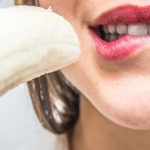Beware: Oral Sex Can Give You Cancer

Rates of oral cancer amongst younger American men have skyrocketed over recent years. And this is being attributed to their rising eagerness to perform oral sex on their various female partners.
On Tuesday, FAIR Health, an independent non-profit, published a report that shows in the States health insurance claims for oral cancer made by men have jumped by 61 percent between 2011 and 2015.
The data outlines that oral cancer is much more common in men than woman, with only 26 percent of claims being made by females.
The main increases were in throat and tongue cancer and one of the chief factors causing these diseases is the spread of human papillomavirus (HPV).
The virus behind the rise in cancer
HPV is very common. It’s a group of over 100 different viruses and some types are more likely to lead to cancer than others.
About 80 percent of both males and females will be infected with one form of HPV in their lifetime. Usually it’s harmless, but in some people it can lead to disease.
The virus infects skin cells and membrane around the mouth and genitals, and transmission occurs when these areas come into contact.
While the virus’ link to cervical and vaginal cancer has been known for some time, over recent years it’s been linked to oral cancers, especially amongst men.
HPV and oral cancer
In 2013, research from the University of NSW suggested a link between oesophageal cancer – which occurs in the oesophagus – and HPV.
Professor Shan Rajendra of the university’s Ingham Institute found the virus present in the oesophageal tissue in a high number of patients suffering the disease.
Oral cancers are also caused by tobacco and alcohol. But over the last couple decades, smoking rates have dropped dramatically, while these types of diseases are on the rise.
Maura Gillison, professor of internal medicine at Ohio State University, told the ABC in 2011 that oral cancers are increasing in several regions around the world, including the United States, Canada and Australia.
When comparing the behaviours of those with oral cancers to people who don’t have one, the professor said that, “the single greatest predictor on whether you have cancer or not is oral sexual behaviour.”
Ms Gillison went on to say that the main factor associated with having an oral HPV infection is the number of partners a person has performed oral sex on, and the “risk increases, as the number of partners increases.”
The sexual revolution
It’s changes in people’s sexual practices that seem to be causing this rise in oral cancer.
Oral sex has become more popular amongst people of all age groups over recent decades. And some women report they find it more intimate and a better way to reach orgasm.
Younger men have a tendency perform oral sex more often than their fathers did. And younger people in general are having more sexual partners at a younger age.
And there’s also the perception that oral sex is less risky.
An Australian Study of Health and Relationships report released in 2014, found that the practice of cunnilingus and fellatio is on the rise in this country.
A decade ago, amongst people between the ages of 16 to 59, 79 percent of men and 67 percent of women had partaken in oral sex, while just a few years ago these figures had risen to 88 percent of men and 86 percent of women.
Michael Douglas’ experience
But it’s not just affecting the younger generation. Hollywood actor Michael Douglas announced in June 2013, that his throat cancer was caused by performing oral sex.
The 72-year-old actor said his disease had nothing to do with his heavy drinking or smoking, “as this particular cancer is caused by HPV, which actually comes about from cunnilingus.”
Douglas went through an intensive eight-week course of chemotherapy and radiation, which was successful and cleared him of cancer.
Speaking in relation to Douglas’ cancer, Mahesh Kumar, a head and neck surgeon in London, said there were increasing recovery rates amongst suffers of this form of the disease.
Women and oral HPV
However, a recent study published in the Canadian Journal of Human Sexuality found that women are twice as likely to go down on their partners, than men are.
So why is the rise in oral cancer happening amongst men?
A study published in the Journal of Infectious Diseases in March this year, found that men are more likely to contract HPV than women and once they have it, they’re less likely to clear that infection. And the specific reason why oral HPV infections are more prevalent and aggressive in men is unknown.
But before men go rushing out to purchase a packet of dental dams or decide they’re never going down again, there is another way.
The cancer preventing shot
A HPV vaccination exists that prevents the risk of cancer. It’s available for free for children aged 12 to 13 under the Australian HPV Vaccination Program. But if you’re older, you can get it from your local GP for a price.
The vaccine was developed by Australian scientists in 2006, to protect women from cervical cancer. But, these days it’s also administered to men and is said to be able to prevent oral cancers.
Adverse reactions
Although there have been reports that the vaccine can cause side-effects.
In May last year, the UK’s Medicines and Healthcare Products Regulatory Agency said they’d received 8,228 suspected adverse drug reaction reports in relation to the HPV vaccine since it’s been in use. And of these 2,587 were classified as serious.
The Japanese government withdrew its recommendation for the HPV vaccine in 2014, because of reported side effects. However, it’s still freely available in the country and the Japanese Paediatric Society advises its use.
So if men are willing to take a risk on the side-effects, then there’s a very real way to ensure they stay alive, whilst keeping their partners satisfied.






